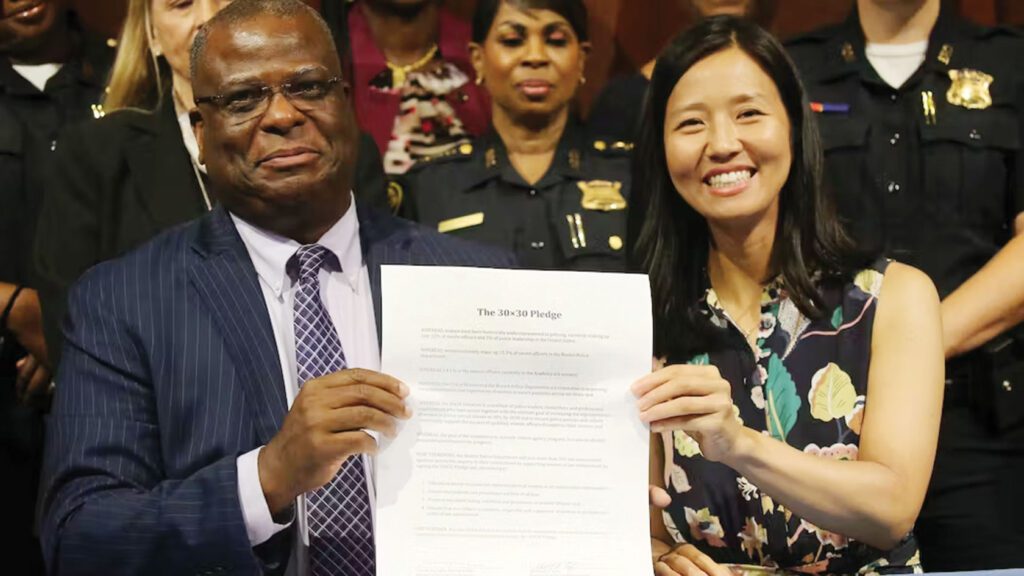
The Boston Police Department recently announced that it has joined the 30×30 Initiative, a commitment to have women make up 30% of sworn recruits by 2030. But officials did not say how much of that figure would include Black women and other women of color.
Police Commissioner Michael Cox made the announcement last week at police headquarters, stressing that the move will make Boston the sixth police department in Massachusetts to join the initiative, after more 325 departments nationwide have done so already.
“We are proud to have a current class of police recruits in our academy that is 24% women,’’ said Cox at the event. “We need to do all we can to have our department represent the members of the communities that we serve. To be inclusive and equitable in all fronts for all genders in general is something that we strive for.”
Mayor Michelle Wu said the initiative is an advancement for women. “When it comes to ensuring that our residents are and feel safe in our city, those who serve must reflect the people and the neighborhoods that we serve,” she said at the event.
Women officers can sometimes experience hostile workplace culture elements — such as a “boys club” mentality, explicit and subtle harassment, sexism, skewed physical fitness assessments, double standards and a lack of support and opportunity — that prevent them from getting promoted, according to the National Institute of Justice, a research unit of the U.S. Department of Justice.
Nationally, women make up about 12% of sworn police officers and only 3% of leadership positions.
In Boston, 15 percent of the patrol officers are women, according to the police department’s website.
Black women make up 5.7% of sworn officers, Hispanic women 2.5% and Asian women 0.3%, according to BPD data — nowhere near the respective population of each demographic in the city.
Women make up approximately 52% of Boston’s population, according to U.S. Census data. The BPD reports that that 41% of leadership positions within the force are occupied by women, including a top job held by Superintendent Lanita Cullinane, who was promoted last year to her current role.
Yet all 11 of the department’s districts are still led by white male captains.
Though officials did not specify target numbers for women of color in the initiative, Cox was flanked by Black women and other women in key positions in the department at last week’s announcement.
Superintendent Nora Baston, who oversees the department’s Bureau of Professional Development, said during the press conference that historically, one of the primary reasons for the lack of women in the force is because police department applicants must take the civil service exam, administered to prospective state employees. The state’s civil service law gives a preference to veterans, a pool made up predominantly of men.
“You’ve seen this shift in policing, and policing is about building relationships, which attracted a lot of females,” she said. “It’s about working with the community and sitting down at a table and having a conversation, which a lot of women have a better time doing.”
Deputy superintendent Nicole Grant, a Black female officer, said at the event that she was 11 years old when she first saw a woman police officer on Boston Common and realized policing was a profession she wanted to pursue.
“No matter wherever I am, whatever time it takes, if there’s ever a young girl who wants to have a job in law enforcement, I’ll take the extra time to talk about it,” Grant said. “And I’ll tell them about the pitfalls … but also the motivation that I knew this was something I want to do long-term.”
Research from the National Institute of Justice suggests implementing practices like mentoring, sponsorship and support networks and strengthening and enforcing harassment policies for women officers will help remove barriers in the profession.
Jeffrey Lopes, the president of the Massachusetts Association of Minority Law Enforcement Officers, said advancing women in policing is “powerful” and something that needs to be done. He added that it allows for “true inclusion” and a “diversity of thought and perspective.”
He added that while the initiative is a great goal, more needs to be done to help promote women once they are sworn into the force.
“The biggest disparity is the access to opportunities for women of color,” he said in an interview. “It’s one thing to get people in the door, and then it’s another thing to give them promotional opportunities, access to specialty units and training.”






